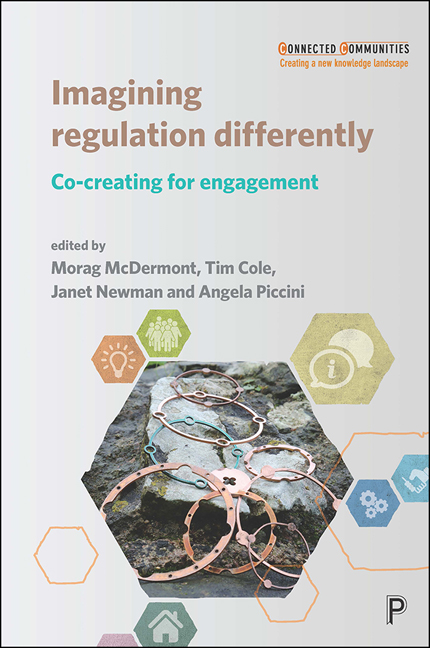Book contents
- Frontmatter
- Dedication
- Contents
- List of Figures, Tables and Boxes
- List of Abbreviations and Acronyms
- Notes on Contributors
- Acknowledgements
- Series Editors’ Foreword
- 1 Introduction: From the Regulation of Engagement to Regulating for Engagement
- 2 Co-Production as Experimentation: the Research Forum as Method
- Interlude: Community Researchers and Community Researcher Training
- 3 Beyond Prevent: Muslim Engagement in city Governance 49
- 4 Regulating for ‘care-ful’ knowledge Production: Researching Older People, Isolation and Loneliness
- 5 Who Gets to Decide what’s in my Fridge? Principles for Transforming the ‘Invisible Rules’ Shaping the Regulation of Food Habits in Urban Spaces
- 6 Life Chances: Thinking with art to Generate new Understandings of Low-Income Situations
- 7 The Making, Mapping and Mobilising in Merthyr Project: Young People, Research and arts Activisms in a Post-Industrial Place
- 8 Regulating Engagement Through Dissent
- 9 The role of Community Anchor Organisations in Regulating for Engagement in a Devolved Government Setting
- 10 Conclusion: Towards an Organic model of Regulating for Engagement
- Postscript: Engaging the University?
- References
- Index
Interlude: Community Researchers and Community Researcher Training
Published online by Cambridge University Press: 03 March 2021
- Frontmatter
- Dedication
- Contents
- List of Figures, Tables and Boxes
- List of Abbreviations and Acronyms
- Notes on Contributors
- Acknowledgements
- Series Editors’ Foreword
- 1 Introduction: From the Regulation of Engagement to Regulating for Engagement
- 2 Co-Production as Experimentation: the Research Forum as Method
- Interlude: Community Researchers and Community Researcher Training
- 3 Beyond Prevent: Muslim Engagement in city Governance 49
- 4 Regulating for ‘care-ful’ knowledge Production: Researching Older People, Isolation and Loneliness
- 5 Who Gets to Decide what’s in my Fridge? Principles for Transforming the ‘Invisible Rules’ Shaping the Regulation of Food Habits in Urban Spaces
- 6 Life Chances: Thinking with art to Generate new Understandings of Low-Income Situations
- 7 The Making, Mapping and Mobilising in Merthyr Project: Young People, Research and arts Activisms in a Post-Industrial Place
- 8 Regulating Engagement Through Dissent
- 9 The role of Community Anchor Organisations in Regulating for Engagement in a Devolved Government Setting
- 10 Conclusion: Towards an Organic model of Regulating for Engagement
- Postscript: Engaging the University?
- References
- Index
Summary
Background: community researchers in the Productive Margins programme
The role of community researchers within the projects of Productive Margins was envisaged at the earliest stages of programme development. This vision was driven, in part, by the expert experience of one of the partner organisations who had previously led a longitudinal qualitative research project in which the fieldwork was primarily conducted by community researchers. It was also informed by the programme's founding understanding: that people and communities have expertise, experience and creativity that can catalyse new spaces for engagement in and the redesign of regulatory regimes. This echoed a wider trend towards the inclusion of community or ‘peer’ researchers within coproduced research processes, recognising that community researchers are, in many ways, a practical example of co-production's attempt to radically redistribute power within the research process.
Who are community researchers?
Community researchers are typically people without any prior recognised research training, with minimal knowledge or experience of research, and who are also ‘peers’ to a project's research participants, sharing at least one ‘lived experience’. Community researchers tend to be community members, and they are distinct from the community partner organisations that are co-producing a project. The roles and responsibilities of community researchers within research projects shift substantially across contexts. Community researchers can be paid employees of an organisation or university, but most are community members who work on a voluntary basis, receiving some alternative form of remuneration for contributed time. In some cases, community researchers are partners in all facets of a research project and are members of the core research team. In the majority, however, they are instrumental in one or more specific aspects of fieldwork or recruitment, or in consulting/reviewing project design, data and findings in a more advisory capacity.
Community researchers’ status as community members locates them in close personal proximity to people whom policymakers often characterise as ‘hard to reach’. In the literature (see the ‘Further reading’ section), community researchers are said to: minimise power differentials between academic researchers and communities who have been marginalised or stigmatised by previous research; reduce ‘blind spots’ experienced by researchers who are at a distance from the realities that they are studying; and produce findings that are more applicable to community contexts.
- Type
- Chapter
- Information
- Imagining Regulation DifferentlyCo-creating for Engagement, pp. 43 - 48Publisher: Bristol University PressPrint publication year: 2020



